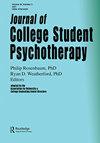基于网络的接受与承诺疗法(e-ACT)对大学生心理健康的改善
IF 1.1
Q3 PSYCHOLOGY, APPLIED
引用次数: 0
摘要
在2019冠状病毒病大流行期间,大学生的心理健康状况明显恶化,尤其是焦虑和抑郁。因此,需要立即采取预防措施,通过使用基于在线的接受和承诺疗法(e-ACT)来纠正这种担忧。在大流行期间,对52名年龄在18至23岁之间的马来西亚本科大学生进行了这种e-ACT对心理灵活性和心理健康的有效性评估。基于小组方法,参与者接受两次在线e-ACT课程(共5小时)。配对样本t检验结果显示,学生在正念、心理灵活性和幸福感方面有了显著改善。Wilcoxon sign Rank检验显示抑郁、焦虑和压力显著减少。这些发现支持使用e-ACT心理健康教育来促进大学生的心理健康。e-ACT对心理灵活性和心理健康的影响有待进一步的实证研究。(PsycInfo数据库记录(c) 2022 APA,版权所有)本文章由计算机程序翻译,如有差异,请以英文原文为准。
The Use of Online-based Acceptance and Commitment Therapy (e-ACT) to Improve the Psychological Wellbeing among University Students
A notable deterioration in mental health, especially anxiety and depression, was seen among university students during the Covid-19 pandemic. Therefore, immediate preventive action is required to remedy this concern by using the online-based Acceptance and Commitment Therapy (e-ACT). The effectiveness of this e-ACT on psychological flexibility and mental wellbeing was assessed among 52 Malaysian undergraduate university students aged between 18 and 23 years old during the pandemic. Based on a small group approach, participants received two online e-ACT sessions (a total of 5 hours). The paired sample t-tests result showed a significant improvement on mindfulness, psychological flexibility, and wellbeing among the students. The Wilcoxon Signed Rank Test showed a significant decrease in depression, anxiety, and stress. These findings support the use of e-ACT mental health education to promote psychological wellbeing among university students. Further empirical studies are needed to test the effectiveness of e-ACT on psychological flexibility and mental wellbeing. (PsycInfo Database Record (c) 2022 APA, all rights reserved)
求助全文
通过发布文献求助,成功后即可免费获取论文全文。
去求助
来源期刊

JOURNAL OF COLLEGE STUDENT PSYCHOTHERAPY
PSYCHOLOGY, APPLIED-
CiteScore
3.20
自引率
7.10%
发文量
16
期刊介绍:
The Journal of College Student Psychotherapy® is dedicated to enhancing the lives of college and university students by featuring high-quality articles about practice, theory, and research in mental health and personal development. Contributions to the journal come from professionals in the field of mental health and counseling and from college staff, faculty, and students. The journal is written specifically for college and university administrative staff and faculty as well as counselors and mental health professionals. Regular quarterly issues of the journal feature articles of central interest to psychotherapists and counselors while also expressing broader implications for everyone who wishes to understand students.
 求助内容:
求助内容: 应助结果提醒方式:
应助结果提醒方式:


